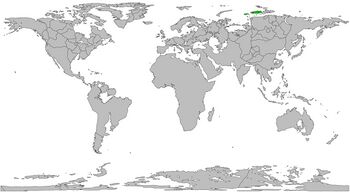West Sevaya Zemla
This article is incomplete because it is pending further input from participants, or it is a work-in-progress by one author. Please comment on this article's talk page to share your input, comments and questions. Note: To contribute to this article, you may need to seek help from the author(s) of this page. |
Socialist Republic of West Sevaya Zemla
| |
|---|---|
|
Flag | |
 | |
| Capital and largest city | West Sakia |
| Official languages |
|
| Religion |
|
| Demonym(s) | West Sevayan |
| Government | Unitary Socialist Dominate-Party Premist Republic |
• Premier | Pasha Utkin |
• Surrogate Premier | Kustuk Fedorov |
• Minister of the Exterior | Taybyyr Syulyugyurov |
| Legislature | National Assembly |
| Area | |
• Total | 66,443 km2 (25,654 sq mi) (77th) |
| Population | |
• 3000 census | 958,438 (71st) |
• Density | 14.4/km2 (37.3/sq mi) (70th) |
| GDP (PPP) | 3000 estimate |
• Total | $23.99 billion (71st) |
• Per capita | $25,027 (61st) |
| GDP (nominal) | 3000 estimate |
• Total | $2.761 billion (75th) |
• Per capita | $2,881 (72nd) |
| Gini (3000) | 32.5 medium (20th (tie)) |
| HDI (3000) | 0.678 medium (59th (tie)) |
| Currency | West Sevayan Ruble (WSR) |
| Time zone | UTC+6 (West Sevayan Standard Time) |
West Sevaya Zemla (WSZ), officially the Socialist Republic of Sevaya Zemla, is a nation in northern Asia. It is an island nation with a coast with the Sibran Sea to the far southwest, the Pasina Sea to the southwest, the Tyamir Sea to the southeast, the Sevaya Channel to the east, and the Sevayan Sea to the northeast.
WSZ ranks moderately high in civil liberties, moderately in HRC-FS human rights, and moderately in political freedom. Civil liberties and political freedom are respected with some restrictions on speech and public gathering, along with harsh prison sentences and environments. Heavy criticism of the government is banned and political protests are restricted to certain days and certain areas. Despite these restrictions, there are no banned political parties and no restrictions on political ideologies.
Much like East Sevaya Zemla, the West Sevayan economy relies on the Golan economy to survive. Many propositions have been presented to join Gola as an autonomous region, most of which have been fought by people and politicians. If WSZ does not join Gola or find alternate economic power, it will face a government and economic collapse. A secondary proposition is to reunite with East Sevaya Zemla to reform Sevaya Zemla. This also has been fought, but recent polls have suggested a rapidly growing consensus to reunite.
Etymology
Sevaya Zemla litarlly translates to Northern Land in Shan. The northern islands of East Sevaya Zemla were first named this in the 1900s. The country of Sevaya Zemla split in 2884 after a short civil war which created the east and west. The name was extended to the collective islands of East and West Sevaya Zemla.
